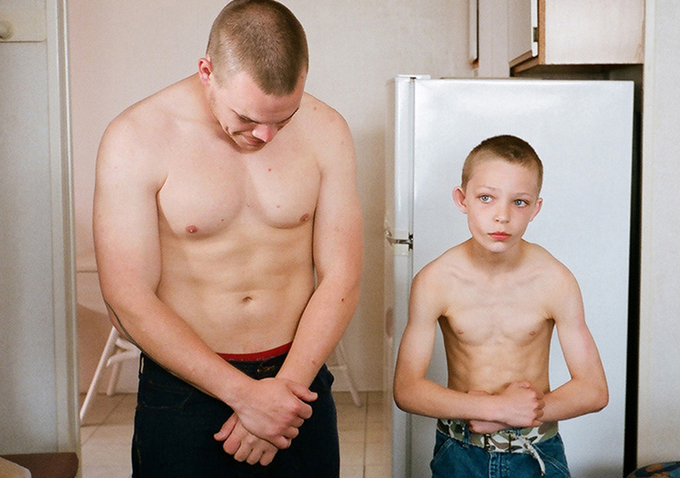
Even the greatest filmmakers are guilty of overly romanticizing boyhood. A little bit of bad behavior and a slice of wildness have fueled boys of the cinema, as they grow up and, in most cases, inexplicably become responsible men. It’s not clear if that occurs at the very end of “Young Bodies Heal Quickly,” though the evocative title gives a sense of how writer-director Andrew T. Betzer feels about the danger faced by his young characters. There are consequences, his film argues, and these characters are fortunate enough to still have youth on their side.
The picture begins with a death. It’s not entirely clear what has happened, but what we see is a small, rural town (we later learn that this is apparently California) where its inhabitants face danger from the most mundane sources. A girl lies motionless after a reckless accident, and two brothers hide as a result. The local policeman wades into the forest and returns, wordlessly, with the older teen’s wrestling helmet. That is enough.
Soon, the two brothers have packed up and departed, leaving behind a forlorn, silent mother. Very little of “Young Bodies Heal Quickly” is conveyed through dialogue. The boys don’t even have names. Gabriel Croft‘s character is called Older in the credits. He’s got a prominent brow and a dead stare, and his silence seems like simplicity: the bulky, muscular child conveys his thoughts with a violent shove, a naughty sneer. The younger one, in an excellent performance, is Hale Lytle. He’s a bit quieter, more thoughtful, and it’s his smarts, resources and cuteness that help buoy the duo. Their relationship doesn’t seem like family, but rather a symbiotic connection. If the older brother could carry the younger one on his back all the time, he would.
The two of them escape suspicion, but there’s no real plan to reach their destination. Like kids, they misbehave, eating garbage food and letting their car take a thorough beating. Their first stop is at their sister’s, played by the flawless Katie Lyn Sheil. Watching her is a microcosm of the experience watching the film. You laugh when the older brother gleefully torments her, and she leaps to her feet, screaming disapproval. Then you see her face, taut, eyes watery, mixed with annoyance and fear. She reacts to their trespassing with the belief that the “boys will be boys” mentality has already gone too far. Ms. Sheil is fast becoming one of the great actresses of her generation, and her nervy discomfort effectively sets the ominous tone for the rest of the film.
The duo soon get involved with a randy motel employee who uses the older brother in a deadly seduction game with her own lover. Here, the older boy has become an object of sexual desire: seeing him as such allows the younger boy to silently understand his sibling’s evolution. He is becoming obsolete, and his brother will not need him any longer—in turn, this makes him cling to the older boy even stronger. A character brandishes a meat cleaver in this segment, and again you laugh and shrink in fear in equal doses.
The two brothers soon find themselves at the doorway of their wayward father, who tends to the yard and outdoors area for a rich family. He is bearded and crazy-eyed, his considerable paunch looking like an embarassment-turned-mark-of-pride. He is basically a stranger to them, and he reacts to their youth indifferently giving them tasks to perform. The older brother is nonplussed, but to see the younger boy rapt at attention as this Australian maniac rambles on about the legacy of Nazism is alternately touching and worrying. Eventually we see the boy wearing a Third Reich t-shirt and modelling for photos with pop, blissfully unaware of the implications. There’s a lot going on here, but clearly Betzer is interested in the way that a cool-headed historical approach to a violent atrocity might not be the proper approach when dealing with young children. The way the camera disdainfully lingers over this memorabilia is fascinating, though at this point you realize Betzer has foregone any actual explicit commentary. The dialogue in this film alone could cover a pamphlet.
This episodic reverie closes with a Vietnam War re-enactment, a hallucinatory moment that feels as if it’s flagging between reality and fantasy. Its participants are, mostly, far too young to have participated in the real thing, but their precise re-creation is upsetting. The two boys end up posing as Vietnamese in this scenario, zapped of words, turned into agents of chaos meant to be destroyed in lieu of re-education. Another fake Vietnamese participant, a woman, is turned into a sex object, degraded for the pleasure of the others who watch. In this moment, the highway is in the background of most shots, but it looks thousands of miles away. This is innocence lost, and never able to find its way back, even if the road is visible. “Young Bodies Heal Quickly” is a haunting film, mostly because the title remains forever in doubt. This is a film of hope. I look forward to the debates as to where in the film people will find it. [A-]
Browse through all our coverage of the 2014 Tribeca Film Festival by clicking here.

